Photographs: Vinay Joshi/Reuters Surabhi Agarwal
Government's decision to suspend Aadhaar-based cash transfers in LPG has dealt a fresh blow to the project whose utility has always been questioned.
First they ignore you, then they laugh at you, then they fight you, then you win…" go the famous words by Mahatma Gandhi.
Every stage of the saying fits the evolution of the Unique Identity or Aadhaar project, except for the last part - winning.
Each time in its four-year journey - which has been no less than a roller-coaster ride - the ambitious project seems to be turning a corner, a controversy here or a revolt there threatens to stop it in its tracks.
Last week, the government decided to put in abeyance direct benefit transfers in cooking gas subsidy - one of the biggest showcases for UID-based payment system in the wake of ground level implementation challenges.
...
Is it the end of the road for Aadhaar?
Image: Nandan Nilekani.Photographs: Reuters
Optimists dismissed it as just another setback for the Nandan Nilekani led-Unique Identification Authority of India (UIDAI), but a 360-degree view of the project reveals the shaky grounds on which it currently stands.
A petition questioning the rationale for making Aadhaar mandatory for government services has turned into a full-fledged argument on the need for the unique identity number, with the very fundamentals of the project being questioned in the Supreme Court.
The court's interim order that no one should suffer for not having the number has also dampened the government's enthusiasm for the direct benefits transfer (DBT) project.
The scheme, which has been piloted in only a few regions, is no longer being pushed by the government with the same aggression.
...
Is it the end of the road for Aadhaar?
Image: Village women stand in a queue to get themselves enrolled for the Unique Identification (UID) database system at Merta district in Rajasthan.Photographs: Mansi Thapliyal/Reuters
Nilekani has been the face of the project and is credited with meandering through various challenges to scale it up. But he has announced his intentions to switch to the political side and contest in the forthcoming elections.
Moreover, the UID Bill, which gives the project a statutory backing, is yet to be cleared by Parliament. Given that the current session will focus on the Interim Budget and will also be the last for this government, the Bill is unlikely to be taken up.
Another piece of legislation, which is required to douse the privacy concerns pertaining to the project - the Privacy Bill - looks like a distant reality too. The Bill, which would have addressed issues such as misuse of information collected by UID by third-party agencies, is still pending approval.
To add to this is the uncertainly surrounding the political landscape in the country. What if the UPA government is voted out of power?
A Bharatiya Janata Party-led government may not prove to be the most favourable for the project's future. The Standing Parliamentary Committee, headed by BJP leader Yashwant Sinha, which studied the UID Bill, had raised many concerns including the very need for UID.
...
Is it the end of the road for Aadhaar?
Aadhaar on steady ground
"What is the threat?" counter-questions a UIDAI official when posed with the various questions facing the project.
The official who does not wish to be identified argues that putting DBT in cooking gas subsidy on hold does not mean that it is being scrapped. He says Aadhaar will continue to be used to identify LPG customers, even though the payments will not be made directly into the bank accounts.
As far as the Supreme Court order is concerned, he says, all the pertinent questions regarding the project will be answered once and for all. "It has created an opportunity for our detractors to shut themselves." The official adds how the Supreme Court's interventions have actually helped decide matters like privatisation in the telecom sector and the spectrum issue subsequently. "Any change in the world has always been resisted like this, so it's nothing unusual."
...
Is it the end of the road for Aadhaar?
Image: UID card holder Ranjna Sonawane with her son Hitesh.Photographs: Uttam Ghosh/Rediff.com
The project has been constantly under fire since its very inception, more from inside the government than outside.
While the Planning Commission - of which UIDAI is an attached body - was the first to raise objections about administrative matters, the project entered into a fierce battle with the Union home ministry's Registrar General of India - which is creating a National Population Registrar - on the issue of collecting biometrics.
Then headed by P Chidambaram, the home ministry had also raised security concerns over UIDAI's enrolment process. The two entered into a compromise later to resolve the matter.
...
Is it the end of the road for Aadhaar?
Photographs: Reuters
"It was the government which did not allow UID to work," says a former UIDAI official, adding that the opposition was due to the fact that Aadhaar was turning into a huge cleansing agent in the government (direct transfer of subsidies to Aadhaar-liked accounts would have minimised the leakage in welfare payments apart from bringing transparency in government functioning). The official who is saddened by the decision on DBT in cooking gas says that he is still "optimistic" as the government is in an "election mode" and doesn't want to antagonise anybody. However, "the project is irreversible now with almost 600 million residents enrolled."
In late 2012, the government decided to roll out DBT on a war footing where the subsidy money would directly go into the Aadhaar-linked bank accounts of the intended beneficiaries.
That was perhaps the only time when the project seemed to have solid backing from the Congress as well as from most wings of the government.
However, issues with ground-level implementation and the subsequent Supreme Court order sapped DBT of its initial momentum. Some bureaucrats attribute the issues that UIDAI has faced to the "hurry" in which the project was implemented.
...
Is it the end of the road for Aadhaar?
Image: Village women stand in a queue to get themselves enrolled for the Unique Identification (UID) database system at Merta district in Rajasthan.Photographs: Mansi Thapliyal/Reuters
Another former official says the correct way for the government to roll-out direct transfers was to ensure significant saturation of Aadhaar first in an area and then link it with welfare payments.
"Without that, public resentment had to be there," the official says, adding that even though Aadhaar has a lot of potential, the DBT scheme was not well thought out. "States were not consulted enough, which is now showing through public feedback."
Another former government official who worked closely with the authority says that in a hurry to meet its target, the authority did not regard "government protocol," which is the prime reason for the bureaucratic resistance it faced. "The utility of Aadhaar was not thought through before rolling out such a large project, its usefulness is still a mirage for people."
However, some are optimistic. Srikanth Nadamuni, chief of Khosla Labs, a start-up incubator who was roped in as a technology advisor by UIDAI, says that the project is in a flux right now and there is bound to be some pushback. "This is an in-between phase for the project, and people will soon see the usefulness of it."
...
Is it the end of the road for Aadhaar?
Photographs: Mansi Thapliyal/Reuters
The positives
To be sure, UIDAI has done remarkably well when it comes to meeting its enrolment target: it has already covered 572 million people and will soon touch the 600 million mark - a target it had set for itself when it first started out.
On Tuesday, the Cabinet also expanded the mandate of UID to enroll beyond 600 million people, which means that more residents will come under the project and faster.
UID officials argue that 60 million bank accounts have been seeded with Aadhaar already and over 100 agencies are using it for authentication services. The number is now expected to see another spurt.
The Reserve Bank of India has also recently asked banks to put in place the infrastructure required to make sure that Aadhaar-based biometrics can be used as an additional factor of authentication for card transactions.
...
Is it the end of the road for Aadhaar?
Photographs: Mansi Thapliyal/Reuters
After the initial resistance, banks have largely accepted Aadhaar for proof of identity and address, and some have also begun to launch applications based on its payment gateway and authentication services. However, they have protested against the latest Reserve Bank of India directive.
Praveen Chakravarty, former head of investment banking at Anand Rathi who worked with UIDAI in the area of financial services, says that banks are opposing the move as it will be an additional cost factor for them, especially when business is strained.
"But, if you look at the current political leadership, they are spending 30-40 per cent of the campaigning time talking about how Aadhaar can help reduce corruption." He adds that therefore saying that the project doesn't have political backing in view of all the opposition it has faced does not hold true.
...
Is it the end of the road for Aadhaar?
Photographs: Mansi Thapliyal/Reuters
Even as the jury is out on whether the ruling United Progressive Alliance government supports the project or not, opposition-ruled Gujarat has been enrolling 100,000 people every day.
This is up from 17,000 to 18,000 earlier, says a government official. The state has already enrolled 26 million people. "This happened after Gujarat chief minister and BJP's prime-ministerial candidate Narendra Modi took stock recently and pushed for it to be fast-tracked." This seems like the biggest hope for the project right now.
MAJOR ROADBLOCKS
* Its purpose has been challenged by a petition seeking Aadhaar not be made mandatory for availing of government services
* UID's biggest utility-direct benefits transfer- has suffered due to implementation issues and the interim order of the Supreme Court. In one year only around Rs 500 crore has been transferred through DBT
* DBT in cooking gas, which has seen transactions of over Rs 3,000 crore, has been put on hold
* The UID bill, which will give UIDAI a statutory backing, is awaiting Parliamentary approval
* Banks have opposed RBI's move to make Aadhaar-based biometrics as second factor authentication for card transactions, citing cost issues.

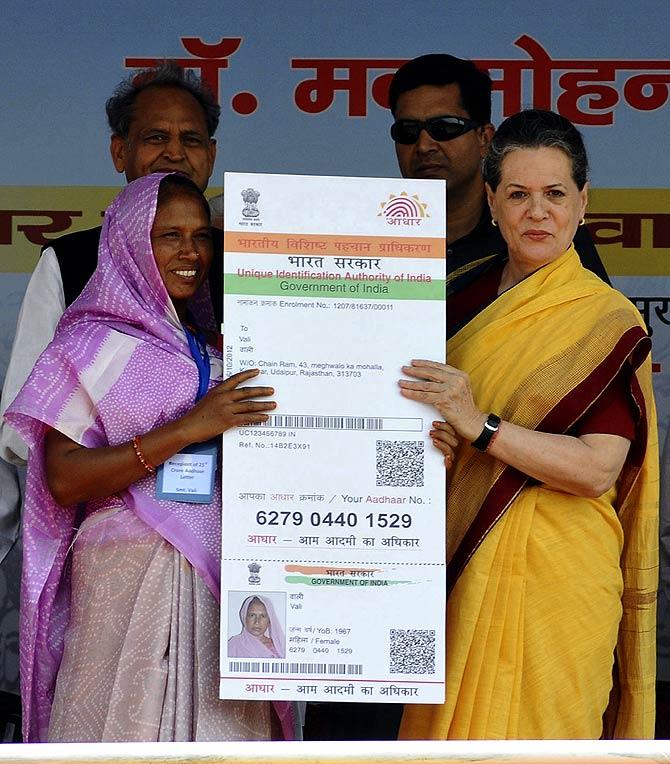
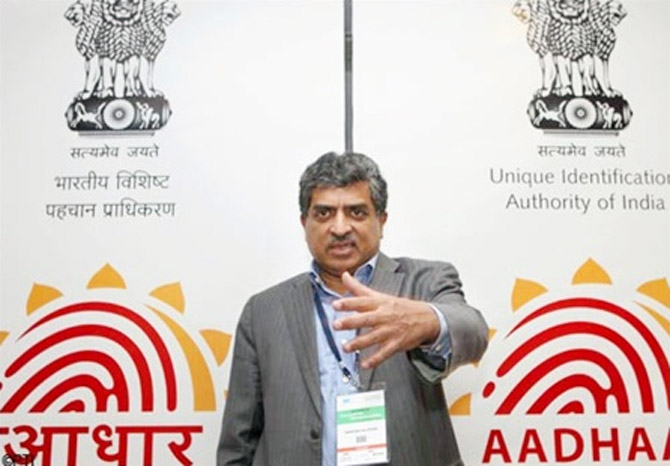
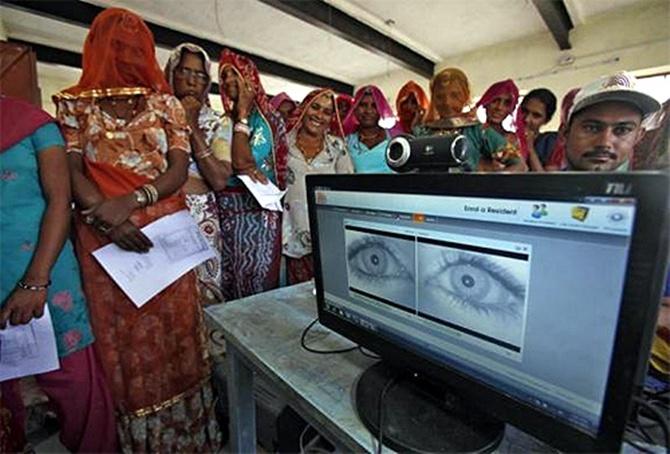
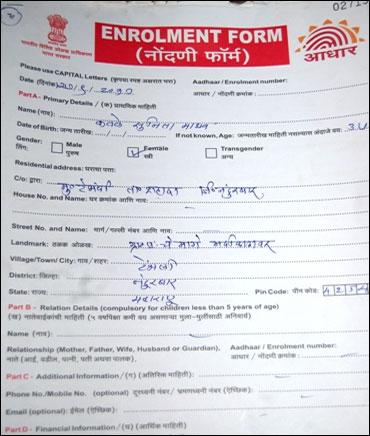
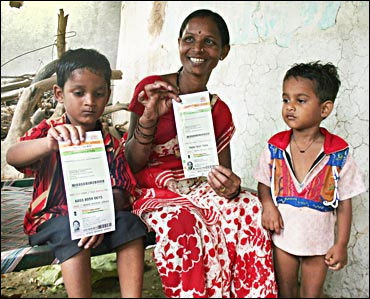
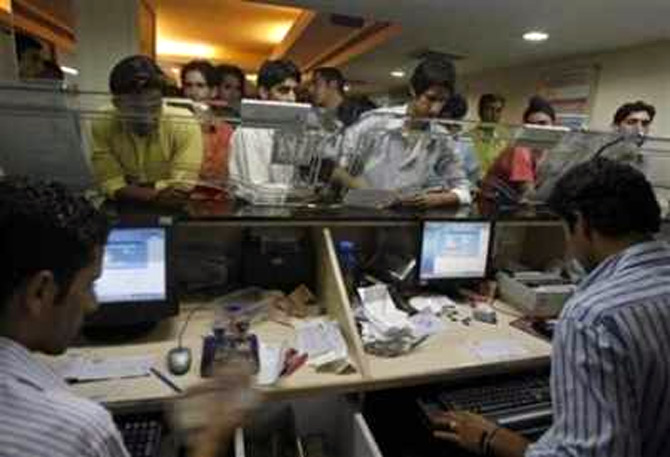
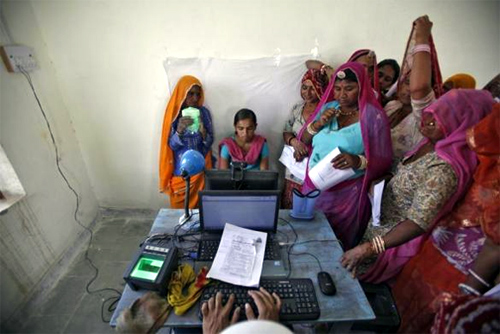
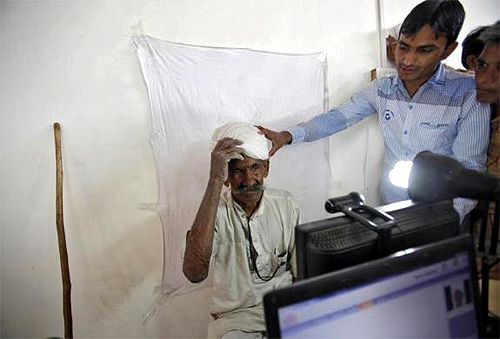
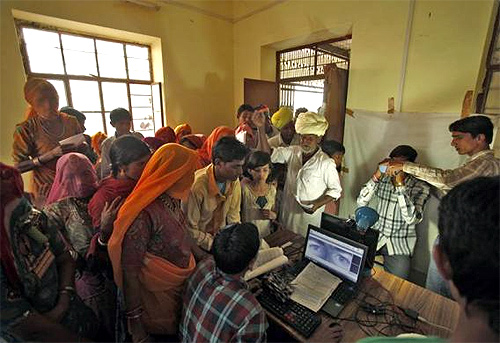
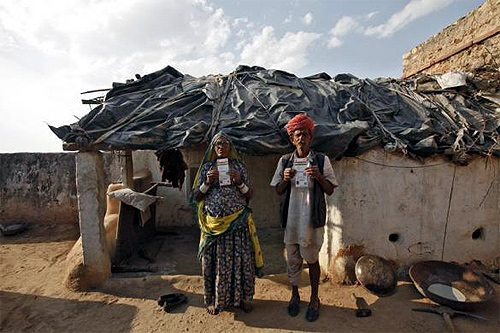

article